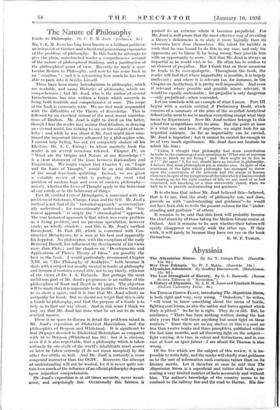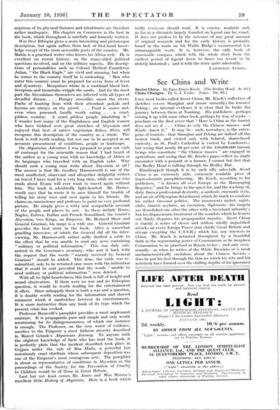Abyssinia
War Over Ethiopia. By W. J. Makin. (Jarrolds. 18s. ) Abyssinian Adventure. By Geoffrey Harmsworth. (Hutchinson. 12s. 6d.)
The Last Stronghold of Slavery. By G. C. Baravelli. (Rome, Societe Editrice di " Novissima.")
A History of Abyssinia. By A. H. M. Jones and Elizabeth Monroe. (Oxford University Press. 6s.) Sin Tuosins Cos:ins-PLATT, introducing The Abyssinian Storni, is both right and very, very wrong. " Onlookers," he writes, " will want to know something about the arena of battle, fighting conditions, as also the nation and forces against which Italy is pitted." So far he is right. They do or did. But, he continues, " There has been nothing written during the last sixty years that will throw anything but scant light on these matters." Since there are on my shelves at this n o neat no less than twelve books and three pamphlets, published within
the last nine months, and all throwing light on the subject— light varying, it is true, in colour and distinctness, and in one
case at least an ignis fatuus—I am afraid Sir Thomas is also wrong.
Of the five which are the subject of this review, it is im- possible to write fully, and the reader will chiefly want guidance as to the sort of information each contains rather than on its literary merits. Let it therefore at once be said that The Abyssinian Storm is a superficial and rather dull book, pre- senting a very limited number of facts accurately and without bias. The author's knowledge of the country seems to be confined to the railway line and the road to Harms. His des-
criptions of its physical features and inhabitants are therefore rather inadequate. His chapter on Commerce is the best in the book, which throughout is carefully and honestly written.
War Over Ethiopia gives a more interesting and picturesque description, but again suffers from lack of first-hand know- ledge except of the more accessible parts of the country. Mr. Makin is a practised writer who knows his Africa well. He is excellent on recent history, on the many-sided political questions involved, and on the military aspects. His descrip- tions of personalities such as Colonel Herbert Fauntleroy Julian, " the Black Eagle," are vivid and amusing, but when he comes to the country itself he is misleading. " Men who enter this country must be prepared for every form of fever and dysentery. Mosquitoes whine in a continual blood lust. Scorpions and tarantulas wriggle the sands. And for the most part the Abyssinians themselves are infected with all types of dreadful disease. . . . Hungry crocodiles snout the rivers. Packs of hunting lions with their attendant jackals and hyenas are always on the prowl. . . . Food is scarce and, even when procured, hardly worth eating . . . a cruel, pitiless country. A cruel, pitiless people inhabiting it." I wonder how many of the Englishmen and English women who have trekked over great stretches of Abyssinia and enjoyed that best of native vegetarian dishes, Shiro, will recognise this description of the country as a whole. The book is well worth reading, but not one to be accepted as an accurate presentment of conditions, people or landscape.
On Abyssinian Adventure I was prepared to pour out vials of contempt for the miserable reason that I had heard of the author as a young man with no knowledge of Africa or its languages who travelled with an English valet. Why should such a young man write about Abyssinia at all ? The answer is that Mr. Geoffrey Harmsworth is one of the most unaffected, observant and altogether delightful writers on travel I have read for a very long time, while no one who reads about Evans will ever want to travel again without him. The book is admittedly light-hearted. Mr. Harms- worth says that he wrote it to save himself the trouble of telling his story • over and over again to his friends. He claims no omniscience and professes to paint no very profound picture. He simply gives a witty and sympathetic account of the people and places he saw. As these include Rome, Naples, Eritrea, Italian and French Somaliland, the tourist's Abyssinia, two Kings, an Emperor, Mr. Bernard Shaw and General Graziani, his range is a wide one. General Graziani provides the best story in the book. After a somewhat gruelling interview, at which the General did all the inter- viewing, Mr. Harmsworth rather sadly drafted a cable to the effect that he was unable to send any news containing " military or political information." This was duly sub- mitted to the Governor's secretary, who sent it back with the request that the words " warmly received by General Graziani " should be added. This done, the cable was re- submitted, only to be returned once more with the intimation that it could be sent provided that the words " unable to send, military or political information " were deleted.
With all its light-heartedness, this book is full of insight and sound observation. If there were no war and no Ethiopian question, it would be worth reading for the entertainment it offers. Since unhappily there is both a war and a question, it is doubly worth reading, for the information and shrewd comment which it sandwiches between its entertainment. It is more instructive than any book of its type which the present crisis has evoked.
, Professor Baravelli's pamphlet provides a most unpleasant contrast.. It is propaganda pure and simple and only worth mentioning for its disingenuousness, of which one instance is enough, The Professor, on the . very worst of evidence, ascribes to the Emperor a most hideous atrocity described in Marcel Griaule's Abyssinian Journey. To anyone with the slightest knowledge of facts who has read the book, it is perfectly plain that the incident described took place in Gojjam under the rule of Ras Hailu, a powerful but notoriously cruel chieftain 'whose subsequent deposition was one of the Emperor's most , courageous acts. The pamphlet is about as representative of conditions in Abyssinia as the proceedings . of the. Society..for. the Prevention of Cruelty to Children would.. be- of those in Great Britain.
- Last but not least comes Mr. Jones and Miss Monroe's excellent little ingory of _Abyssinia. Here is .a book which
really everyone should read. It is concise, readable and, as far as a chronicle largely founded On legend can be, exact. It does not profess to be the outcome of any great amount of original research and for the early history is probably based in the main on Sir Wallis Budge's monumental but unmanageable work. It is, however, the only book of reasonable compass which tells the whole story from the earliest period of legend down to times too recent to be strictly historical ; and it tells the story quite admirably.
LAWRENCE ATIIILL.











































 Previous page
Previous page